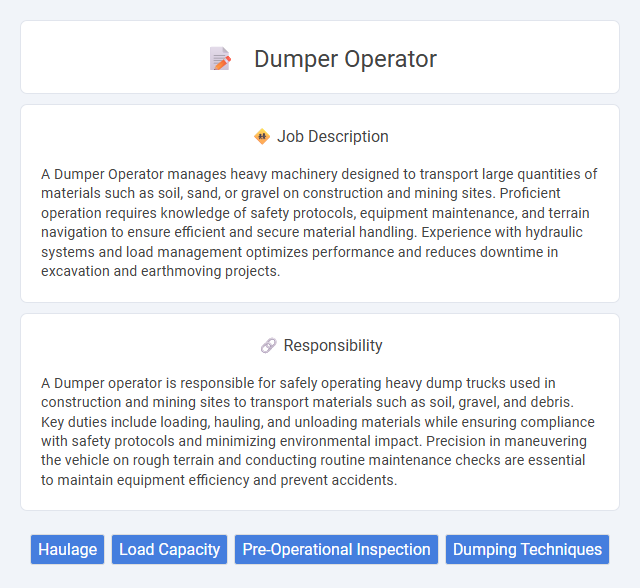
A Dumper Operator manages heavy machinery designed to transport large quantities of materials such as soil, sand, or gravel on construction and mining sites. Proficient operation requires knowledge of safety protocols, equipment maintenance, and terrain navigation to ensure efficient and secure material handling. Experience with hydraulic systems and load management optimizes performance and reduces downtime in excavation and earthmoving projects.
Dumper operator jobs likely suit individuals who are physically fit and capable of handling demanding tasks in outdoor environments. Those with good hand-eye coordination and the ability to focus on machinery operation may find this role appropriate. Individuals prone to fatigue or with limited mechanical skills might face challenges in maintaining efficiency and safety.
Qualification
Dumper operators must possess a high school diploma or equivalent, with specialized training in heavy machinery operation and safety protocols. Proficiency in vehicle maintenance, strong spatial awareness, and the ability to follow detailed instructions are essential qualifications. Certifications such as a commercial driver's license (CDL) and Occupational Safety and Health Administration (OSHA) training enhance employability in this role.
Responsibility
A Dumper operator is responsible for safely operating heavy dump trucks used in construction and mining sites to transport materials such as soil, gravel, and debris. Key duties include loading, hauling, and unloading materials while ensuring compliance with safety protocols and minimizing environmental impact. Precision in maneuvering the vehicle on rough terrain and conducting routine maintenance checks are essential to maintain equipment efficiency and prevent accidents.
Benefit
A Dumper operator position likely offers competitive wages and opportunities for overtime pay due to the demanding nature of the job. Benefits might include health insurance, paid time off, and retirement plans, enhancing overall job security. Training and skill development could also be available, increasing long-term career prospects within the construction or mining industries.
Challenge
Operating a dumper often involves navigating uneven terrain and heavy loads, which likely requires strong concentration and quick reflexes. The challenge of maintaining safety while adhering to tight schedules may frequently test an operator's decision-making skills under pressure. Mastery of this role probably hinges on balancing the physical demands with precision handling to prevent accidents and equipment damage.
Career Advancement
Dumper operators gain valuable experience in heavy machinery handling and site logistics, which opens opportunities for advancement into roles such as heavy equipment supervisor or site manager. Mastery of safety protocols and equipment maintenance enhances eligibility for specialized positions in construction or mining industries. Continuous skill development through certifications and on-the-job training accelerates career progression and higher wage potential.
Key Terms
Haulage
A dumper operator in haulage is responsible for operating heavy machinery to transport bulk materials such as soil, sand, and gravel efficiently across construction sites or mining areas. Expertise in maneuvering articulated or rigid dump trucks ensures timely and safe delivery of loads, optimizing workflow and minimizing delays. Mastery of site safety protocols and routine vehicle inspections supports smooth haulage operations and reduces equipment downtime.
Load Capacity
A dumper operator manages heavy-duty vehicles specifically designed for transporting bulk materials on construction sites, with load capacities typically ranging from 3 to 25 tons. Operating dumpers requires precise control to safely handle heavy loads while maintaining efficiency in material transport. Understanding the vehicle's load capacity ensures compliance with safety standards and optimizes the workflow in excavation and earthmoving projects.
Pre-Operational Inspection
A Dumper operator must conduct a thorough pre-operational inspection to ensure vehicle safety and functionality, including checking hydraulic systems, tires, brakes, and fluid levels. Identifying potential mechanical issues or leaks before operation minimizes downtime and prevents accidents on construction sites. Proper inspection procedures align with OSHA safety standards and contribute to efficient dumper performance.
Dumping Techniques
Dumper operators utilize various dumping techniques to efficiently unload materials at construction and mining sites, ensuring precise placement to optimize workflow and site safety. Key methods include side dumping, end dumping, and bottom dumping, each suited for specific terrain and load types to minimize spillage and enhance productivity. Mastery of these techniques allows operators to manage heavy loads effectively, reduce equipment wear, and maintain environmental compliance.
 kuljobs.com
kuljobs.com